Let’s face it. Sooner or later your family may encounter a natural disaster or emergency event that requires you to jump into action to stay safe and sound. Doing so will become much easier when you are prepared and you have a plan.
Formulate an Emergency Preparedness Plan for Your Family
- Where will you go when an emergency arises?
Will you stay at home and shelter in place? Will you head out of town and evacuate? If you are heading out, where will you go and where will you stay? Create a plan for both scenarios.These are important questions to ask ahead of time so you aren’t thinking about this for the first time when you are in the middle of a disaster. Those are stressful times and it can be hard to make smart decisions quickly in those types of pressure situations. A big part of your emergency preparedness plan includes thinking through possible scenarios and then getting the information you’ll need ahead of time. For example, figure out alternate routes you can take to get out of your area, determine where you will go, and write down the addresses and phone numbers for the hotels or people you might stay with. Do not rely on being able to access this information on your cell phone.If you’re evacuating with any pets, check to make sure the place you plan to stay will allow you to bring your furry family members.
A big part of your emergency preparedness plan includes thinking through possible scenarios and then getting the information you’ll need ahead of time. For example, figure out alternate routes you can take to get out of your area, determine where you will go, and write down the addresses and phone numbers for the hotels or people you might stay with. Do not rely on being able to access this information on your cell phone.If you’re evacuating with any pets, check to make sure the place you plan to stay will allow you to bring your furry family members.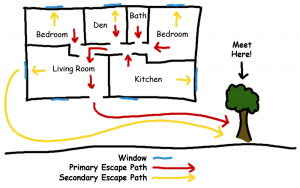 One scenario that everyone needs to have a plan for is in case of fire. Years ago, my husband’s uncle was in a house fire. He got out of the house unscathed and was frantically looking for his wife. When he did not see her outside, he ran back into the burning home to save her. He was overcome with smoke, became disoriented, and lost consciousness. Although the fire was extinguished before it got to him, he died of smoke inhalation. Unbeknownst to him, his wife had escaped the flames by jumping out of a second story window. She was resting on the side of the house. Had they created a designated meeting place outside, he would have known she was okay and would not have gone back in to rescue her.
One scenario that everyone needs to have a plan for is in case of fire. Years ago, my husband’s uncle was in a house fire. He got out of the house unscathed and was frantically looking for his wife. When he did not see her outside, he ran back into the burning home to save her. He was overcome with smoke, became disoriented, and lost consciousness. Although the fire was extinguished before it got to him, he died of smoke inhalation. Unbeknownst to him, his wife had escaped the flames by jumping out of a second story window. She was resting on the side of the house. Had they created a designated meeting place outside, he would have known she was okay and would not have gone back in to rescue her.
- How will you stay in touch with loved ones?
There is nothing scarier than not being able to get in touch with loved ones during a disaster or emergency event, to find out if everyone is okay. Just as important is being able to receive news and emergency alerts or announcements. Think about how you will accomplish this, both while you’re on the road, as well as when you’re staying in your home or at an emergency shelter.Make sure everyone has a mobile phone. Don’t forget that these devices need to be fully charged before disaster strikes…if you have advanced warning. Having chargers (including car chargers) with you is a must. An additional battery or a backup power supply will come in very handy, as well.Be conservative with your device usage to make the battery power last as long as possible. Change settings so background apps don’t run the battery down. It’s important to talk to your kids about this ahead of a disaster and remind them regularly.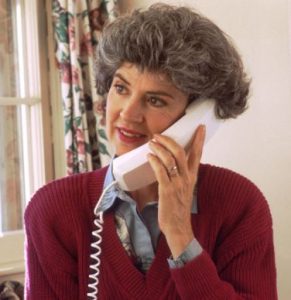 Don’t rely on just your smart phone for news and communication. A backup plan will come in handy when you can’t get a good connection or you run out of power on your device. Designate a person whom everyone can contact— preferably far away from the geographic area experiencing the disaster–when you can’t get ahold of each other. For example, my family lives in the Seattle area, and I have a sister in Scottsdale. If we experience an earthquake in Seattle, it would not affect her…so she is a great back-up contact for everyone in my family to call so we can relay messages if we are unable to reach each other.Have a backup solution for finding out what’s going on, like a weather radio. Be sure you keep some extra batteries for this in a zippered baggie.
Don’t rely on just your smart phone for news and communication. A backup plan will come in handy when you can’t get a good connection or you run out of power on your device. Designate a person whom everyone can contact— preferably far away from the geographic area experiencing the disaster–when you can’t get ahold of each other. For example, my family lives in the Seattle area, and I have a sister in Scottsdale. If we experience an earthquake in Seattle, it would not affect her…so she is a great back-up contact for everyone in my family to call so we can relay messages if we are unable to reach each other.Have a backup solution for finding out what’s going on, like a weather radio. Be sure you keep some extra batteries for this in a zippered baggie. - What supplies do you need?
The more prepared you are, the safer and more comfortable you’ll be when the inevitable happens. Depending on what natural disaster you face, where you live, who is part of your family, and weather conditions, will determine the supplies you need.Start with the basics you need for survival. This includes food, water, shelter, and medication. Don’t forget about your pets. From there, start thinking about creature comforts like light and entertainment. Having a headlamp and a good book can make waiting out a power outage a lot more pleasant after dark. Enjoy a cup of hot chocolate made with a camping stove, hot water, and instant cocoa mix. The more prepared you are, the greater the chances of making it through the emergency or disaster.If you live in severe weather places, consider what you may need to shield you from the blistering sun or keep you warm and dry in bitter cold weather.
Don’t forget about your pets. From there, start thinking about creature comforts like light and entertainment. Having a headlamp and a good book can make waiting out a power outage a lot more pleasant after dark. Enjoy a cup of hot chocolate made with a camping stove, hot water, and instant cocoa mix. The more prepared you are, the greater the chances of making it through the emergency or disaster.If you live in severe weather places, consider what you may need to shield you from the blistering sun or keep you warm and dry in bitter cold weather.
 Don’t wait until an emergency or disaster strikes. Get prepared now! Here’s how… make a list of all that you need to do in order to be prepared. Then add these tasks to your calendar and do each one until you’ve checked everything off the list.
Don’t wait until an emergency or disaster strikes. Get prepared now! Here’s how… make a list of all that you need to do in order to be prepared. Then add these tasks to your calendar and do each one until you’ve checked everything off the list.
This is the second of a four-part blog post. Watch your mailbox tomorrow for the third one. Click here to read previous posts. If you’d like to receive my FREE guide that includes information and tips provided in all four blog posts, please click here.
Will you commit to scheduling time as a family to make a plan? What will you do to help your family be as prepared as possible if disaster strikes? If you have tips to share–especially if you’ve lived through a previous disaster–please share below.
Additional Resources
A company called B-air.com provides these free tips:
- Flood Preparedness guide – Includes BEFORE, DURING and AFTER tips, also sections for pets and senior
- Water Categories and Water Damage Classifications– Includes the comparison of water damages and waters with comprehensive comparison
- Disaster Preparedness Plan – An infographic of different types of disasters
- How To Prepare For Natural Disasters – A complete guide for emergency








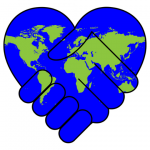
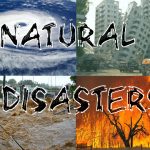
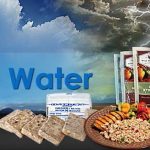
Thanks for posting this awesome article. I’m a long time reader but I’ve never been compelled to leave a comment. I subscribed to your blog and shared this on my Facebook. Thanks again for a great post!